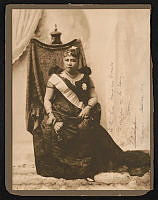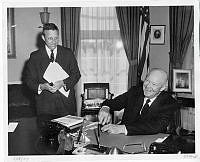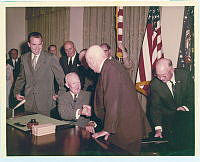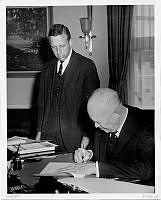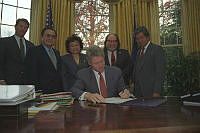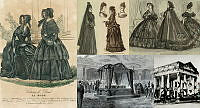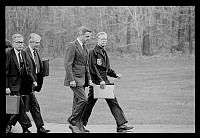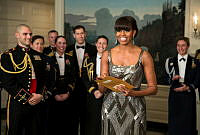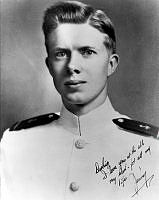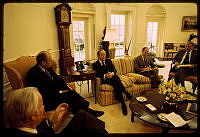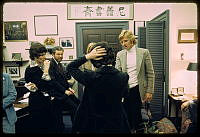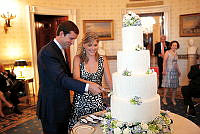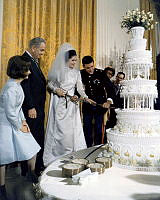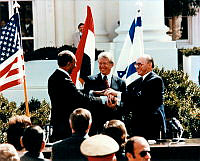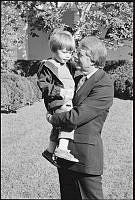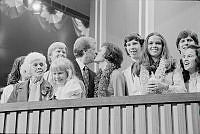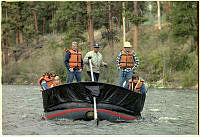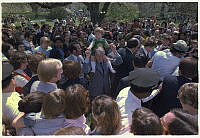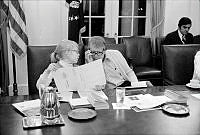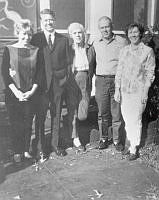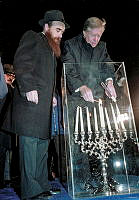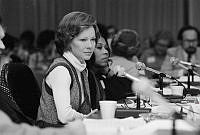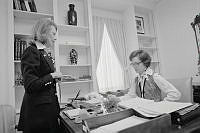William J. Clinton

During his two presidential terms, Bill Clinton presided over economic expansion and achieved the first budget surplus in decades. Unemployment, inflation, and the crime rate decreased during his administration. After attempting a major reform of the health care system, Clinton shifted his policy focus, declaring that "the era of big government is over."
The son of a nurse, Clinton was born William Jefferson Blythe III in 1946 in Hope, Arkansas, three months after his father died in a car accident. (He later took his stepfather’s family name.) Clinton made his way to Georgetown University and won a Rhodes scholarship to Oxford. After Yale Law School, he returned to Arkansas, and came close to being elected to the U.S. House of Representatives in 1974. The following year, he married his fellow Yale Law graduate Hillary Rodham, and in 1980, their daughter Chelsea was born.
Clinton was elected the state’s attorney general at age 30 and governor at 32. But in 1980, he was defeated for a second term by voters who feared that he had become too liberal for Arkansas. When they restored him to power two years later, he thanked them for giving him a “second chance.”
Eschewing a presidential race in 1988, he ran in 1992 and won the Democratic nomination. With the Cold War just over, he argued that President Bush had not done enough about domestic problems such as the recession that afflicted the nation. Political independent Ross Perot entered the presidential race. Clinton won the three-way election with only 43 percent of the popular vote, but an overwhelming majority of Electoral College votes.
In his first two years in office, Clinton moved aggressively on health care reform, the budget, and the North American Free Trade Agreement. Reacting to Clinton’s policy overreach, the Republicans in 1994 won a majority in both houses of Congress for the first time in 40 years. Consequently, Clinton adjusted his posture and moved to the political center. He won reelection in 1996, defeating former Senate Majority Leader Robert Dole.
Confronted with continued Republican control of Congress, Clinton turned to foreign policy. He championed NATO bombing to stop ethnic cleansing in Kosovo, approved the bombing of Iraq to “deny” Saddam Hussein the “capacity” to use weapons of mass destruction, and worked hard to broker peace between Israel and the Palestinians.
In 1998, while questioned under oath, Clinton falsely denied a sexual relationship with a woman who worked as a White House intern. His belated apology and admission that he had lied under oath did not stop demands that he resign or be impeached. The House of Representatives approved two articles of impeachment on the charges of perjury and obstruction of justice. However, the Senate voted to acquit Clinton on both counts in 1999.
An important element of Clinton’s political survival was the steadfast public support of his wife, Hillary. In 2000, the couple established residence in Chappaqua, New York, and she won election from that state to the U.S. Senate.
Following his years as president, Clinton built a foundation, wrote his memoirs, and oversaw the creation of his presidential library in Little Rock, Arkansas. He also supported Hillary Clinton’s political career during her tenure in the Senate and as secretary of state, and her 2008 and 2016 presidential campaigns. He remains actively involved with the work of the William J. Clinton Presidential Center and the initiatives of the Bill, Hillary & Chelsea Clinton Foundation.













